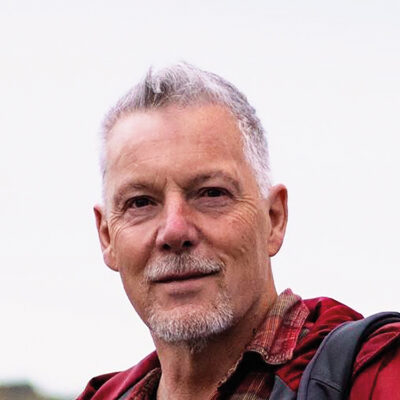
Volcanologist Dave McGarvie, talks to Bryony Cottam, on how to travel with purpose

PASSPORT
Looking up from the slopes of Quetrupillán, Dave McGarvie watched the condors circle overhead. ‘They were there most days, checking to see whether we were still alive,’ he says. From this vantage point, McGarvie had a good view of Villarica, one of South America’s most active volcanoes. Its last major eruption, in 2015, occurred during one of his fieldtrips; the volcanologist had woken to find a dusting of ash on his tent and in his cooking pots.
But McGarvie wasn’t there for Villarica. Instead, he and his Chilean colleague were focused on its lesser-known, dormant neighbour, where they hoped to study how Quetrupillán’s past lava flows had interacted with ice. It’s a topic that attracted McGarvie back to researching volcanoes after taking a 10-year break to focus on his family. ‘I looked around and thought, nobody’s really doing a lot of work on volcano–ice interactions, there were a lot of unknowns.’
Dave’s travel insights
• An understanding of geological and geographical factors adds insight to your appreciation of a landscape
• Don’t take foolhardy risks. Think carefully before going
• Find your own niche – you don’t have to follow the footsteps of others
McGarvie says that this line of research has taken him to many volcanoes that simply don’t attract the same level of interest from other researchers. In Iceland, where McGarvie spends much of his time, the most well-monitored sites are the ones that have shown recent activity. ‘I’m more interested in what happened over 10,000 years ago at volcanoes that aren’t showing signs of unrest, but which are probably going to erupt again at some point in the future.’
As such, he says, his work complements that of other geologists working on the island. Finding his own niche has also given him the opportunity to study and explore new places, often in remote parts of Iceland where no one has ever been before. ‘I don’t really want to do anything that’s following in other people’s footsteps,’ he says.
Exploration has been a driving force for McGarvie’s work, and a lot of his earlier field trips involved a high level of self-sufficiency. Getting to Quetrupillán, for example, had been ‘quite a logistical enterprise’. The only way up is on foot or – when loaded up with rock samples, a tent and enough food for a couple of weeks – on horseback. Today, things have changed. ‘We now have satellite phones and thorough risk assessments, which is all for the better. There are students who want the challenge of climbing 4,000 feet up a mountain, but there are other interesting problems to work on that don’t require much physical effort.’
Planning a trip to a volcano involves a significant level of care for the professional volcanologist. A word of advice for independent travellers – volcanologists such as McGarvie pay very close attention to official information and volcano alert levels, as these describe the current level of activity and unrest at a volcano, and its eruption history. ‘Even experienced volcanologists are wary of going to volcanoes experiencing unrest. Volcanoes are not just normal mountains you climb any time you want to – you need to think carefully about going. There are inherent risks and dangers. Some volcanoes are particularly unpredictable and those are best avoided. People may be thrilled by the idea of being close to an erupting volcano, but there are plenty of fantastic things to see without putting yourself in danger.’
Although McGarvie has a long list of volcanoes such as New Zealand’s Ruapehu that, were it not for the cost, he would love to visit, he’s just as happy travelling around Scotland. ‘I was in Ayrshire last week looking at the ancient volcanic rock. I realised I was seeing things that no one has ever reported before. For anyone who is interested in the natural world,’ he adds, ‘having an understanding of the geological and geographical aspects of a landscape, such as how a mountain came to be, can greatly enhance our appreciation and connection to a place.’




